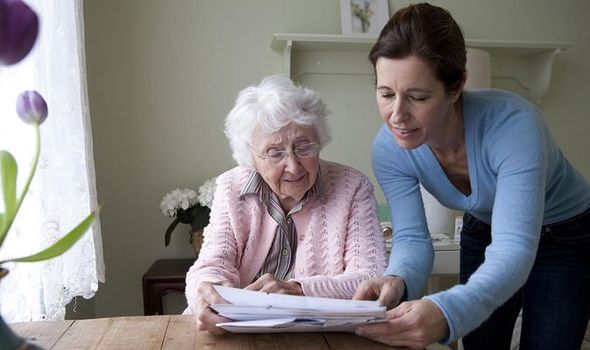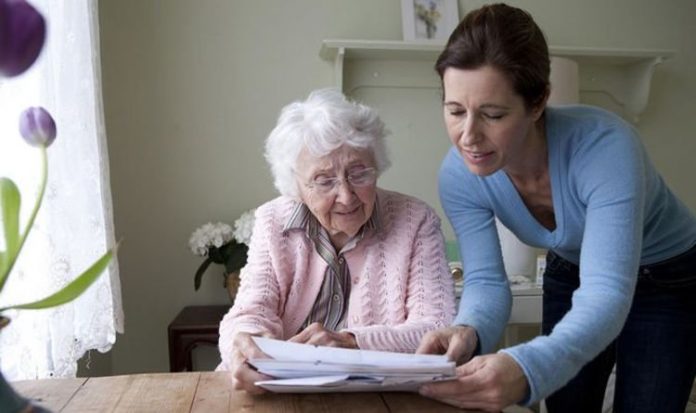
We will need more carers as the population ages (Image: Getty)
Free care in Wolverhampton was offered by the Clinical Commissioning Group (CCG) to 160 people per 50,000 of the population from April to June in 2018. But the figure plummeted to 31.65 before totalling 38.22 between January and March this year. A postcode lottery where sick people qualify for treatment while others do not is obvious. NHS Salford CCG offers free treatment for Continuing Healthcare (CHC) conditions such as dementia, arthritis and heart disease to 211.81 patients per 50,000 – the highest rate of all England’s CCGs.
But NHS Berkshire West takes care of just 12.69 people which is the lowest level in the country.
Campaigners say the rationing of this healthcare is the “biggest public scandal of modern times”.
Now the Daily Express is urging families to join the fightback against an injustice which sees sick patients bankrupted after being denied their right to free universal health care.
Retired Rear Admiral Philip Mathias – of the nhschcscandal.co. uk campaign – who was forced to fight for a refund of £200,000 spent on his mother’s care in Wiltshire, said: “There is overwhelming evidence that this CHC scandal has unlawfully denied tens of thousands of very ill and vulnerable people the healthcare funding they are legally entitled to.

Dame Esther Rantzen (Image: Getty)
“There has been devastating emotional and financial consequences with people spending their life savings and unlawfully forced to sell their homes.
“Unlike social care, which is means-tested, CHC is about healthcare, which by law is free at the point of use. You may not need this healthcare funding now but there is a good chance that you, a loved one or a friend will require it sometime in the future, not least given the ageing population and the increasing occurrence of dementia.”
The group is preparing to take the Government to court to fight for a judicial review of the policy.
And they are being supported by Dame Esther Rantzen and John Stiles, the son of World Cup hero Nobby Stiles.
Dame Esther said: “It’s shocking that so many desperately ill and vulnerable people are not getting the healthcare funding they are entitled to, which causes so much emotional distress and often financial devastation. I fully support the campaign to rectify this injustice.”
The average cost of a residential care home in the UK has risen from £33,852 a year in 2019 to £47,320.
Free NHS healthcare is a right but CCGs are accused of raising the qualification thresholds so high it becomes very difficult to access.
Families have told of their fights against ignorance, obstruction and official incompetence.
HOW TO DONATE
The Daily Express is urging people to fightback against an injustice which sees sick patients denied their right to free universal NHS health care. Rear Admiral Mathias said: “A donation from Daily Express readers towards the costs of this legal action will significantly increase the chances of successfully holding the government to account. It will be forced to rectify this disgraceful state of affairs – probably one of the biggest public scandals of modern times.”
More information about the CHC campaign and details of how to donate towards the legal fight are found at https://www.crowdjustice.com/case/the-nhs-continuing-healthcare-scandal
.
Caring can be a rewarding profession, says MADELEINE BUNTING
I began researching care for two reasons.
On the one hand, more elderly people were unable to access the daily care they needed.
On the other hand, care workers were badly paid and their conditions deeply distressing as they were forced to rush from one home visit to the next.
The second reason was personal.
I had reached my 50s and raising a family had involved huge effort and time.
Yet the labour of love – care – was by no means done.
One in four women in their 50s has major care responsibilities and the numbers are growing.
As they move into their 60s, time devoted to care increases significantly.
Figures show a 43 percent increase in those offering 20-50 hours of care a week and some offer as much as 100 hours a week.
As lives lengthen, the chances are that in old age many of us will find we have a new full-time job as a carer – those in their 80s caring for those in their 90s.
This is the epicentre of the crisis of care, but the more I looked into it the more evidence I found of care deficits elsewhere.
The childcare sector is deeply precarious, and across healthcare, staff are overloaded with work and dogged by a tick-box bureaucracy that was there long before COVID-19.
Breakthroughs in medical science have not always been matched by the need for relationships. Patients, often frightened and vulnerable, need reassurance as much as clinical expertise.
On the positive side, jobs offering care is a growing area of secure employment.
With the right pay and conditions, it can be rewarding.
The big challenge is to invest in the good care essential to human wellbeing. Recognising the value of care would be the first step towards a major shift in our priorities.
• Labours Of Love: The Crisis Of Care by Madeleine Bunting is published by Granta and available now







